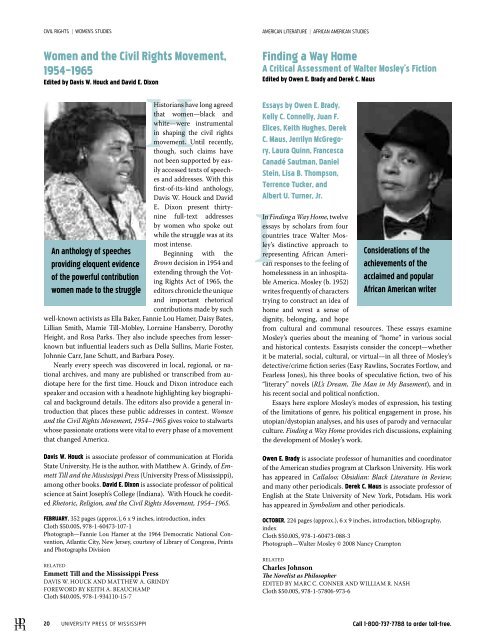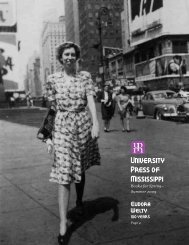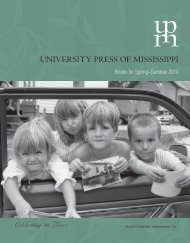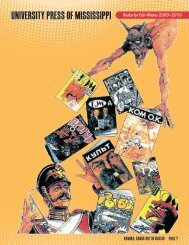University Press of Mississippi
University Press of Mississippi
University Press of Mississippi
Create successful ePaper yourself
Turn your PDF publications into a flip-book with our unique Google optimized e-Paper software.
CIVIL RIGHTS | WOMEN’S STUDIES<br />
Women and the Civil Rights Movement,<br />
1954–1965<br />
Edited by Davis W. Houck and David E. Dixon<br />
An anthology <strong>of</strong> speeches<br />
providing eloquent evidence<br />
<strong>of</strong> the powerful contribution<br />
women made to the struggle<br />
HHistorians have long agreed<br />
that women—black and<br />
white—were instrumental<br />
in shaping the civil rights<br />
movement. Until recently,<br />
though, such claims have<br />
not been supported by easily<br />
accessed texts <strong>of</strong> speeches<br />
and addresses. With this<br />
first-<strong>of</strong>-its-kind anthology,<br />
Davis W. Houck and David<br />
E. Dixon present thirtynine<br />
full-text addresses<br />
by women who spoke out<br />
while the struggle was at its<br />
most intense.<br />
Beginning with the<br />
Brown decision in 1954 and<br />
extending through the Voting<br />
Rights Act <strong>of</strong> 1965, the<br />
editors chronicle the unique<br />
and important rhetorical<br />
contributions made by such<br />
well-known activists as Ella Baker, Fannie Lou Hamer, Daisy Bates,<br />
Lillian Smith, Mamie Till-Mobley, Lorraine Hansberry, Dorothy<br />
Height, and Rosa Parks. They also include speeches from lesserknown<br />
but influential leaders such as Della Sullins, Marie Foster,<br />
Johnnie Carr, Jane Schutt, and Barbara Posey.<br />
Nearly every speech was discovered in local, regional, or national<br />
archives, and many are published or transcribed from audiotape<br />
here for the first time. Houck and Dixon introduce each<br />
speaker and occasion with a headnote highlighting key biographical<br />
and background details. The editors also provide a general introduction<br />
that places these public addresses in context. Women<br />
and the Civil Rights Movement, 1954–1965 gives voice to stalwarts<br />
whose passionate orations were vital to every phase <strong>of</strong> a movement<br />
that changed America.<br />
Davis W. Houck is associate pr<strong>of</strong>essor <strong>of</strong> communication at Florida<br />
State <strong>University</strong>. He is the author, with Matthew A. Grindy, <strong>of</strong> Emmett<br />
Till and the <strong>Mississippi</strong> <strong>Press</strong> (<strong>University</strong> <strong>Press</strong> <strong>of</strong> <strong>Mississippi</strong>),<br />
among other books. David E. Dixon is associate pr<strong>of</strong>essor <strong>of</strong> political<br />
science at Saint Joseph’s College (Indiana). With Houck he coedited<br />
Rhetoric, Religion, and the Civil Rights Movement, 1954–1965.<br />
FEBRUARY, 352 pages (approx.), 6 x 9 inches, introduction, index<br />
Cloth $50.00S, 978-1-60473-107-1<br />
Photograph—Fannie Lou Hamer at the 1964 Democratic National Convention,<br />
Atlantic City, New Jersey, courtesy <strong>of</strong> Library <strong>of</strong> Congress, Prints<br />
and Photographs Division<br />
RELATED<br />
Emmett Till and the <strong>Mississippi</strong> <strong>Press</strong><br />
Davis W. Houck and Matthew A. Grindy<br />
Foreword by Keith A. Beauchamp<br />
Cloth $40.00S, 978-1-934110-15-7<br />
AMERICAN LITERATURE | AFRICAN AMERICAN STUDIES<br />
Finding a Way Home<br />
A Critical Assessment <strong>of</strong> Walter Mosley’s Fiction<br />
Edited by Owen E. Brady and Derek C. Maus<br />
Essays by Owen E. Brady,<br />
Kelly C. Connelly, Juan F.<br />
Elices, Keith Hughes, Derek<br />
C. Maus, Jerrilyn McGregory,<br />
Laura Quinn, Francesca<br />
Canadé Sautman, Daniel<br />
Stein, Lisa B. Thompson,<br />
Terrence Tucker, and<br />
Albert U. Turner, Jr.<br />
I<br />
In Finding a Way Home, twelve<br />
essays by scholars from four<br />
countries trace Walter Mosley’s<br />
distinctive approach to<br />
representing African American<br />
responses to the feeling <strong>of</strong><br />
homelessness in an inhospitable<br />
America. Mosley (b. 1952)<br />
writes frequently <strong>of</strong> characters<br />
trying to construct an idea <strong>of</strong><br />
home and wrest a sense <strong>of</strong><br />
dignity, belonging, and hope<br />
Considerations <strong>of</strong> the<br />
achievements <strong>of</strong> the<br />
acclaimed and popular<br />
African American writer<br />
from cultural and communal resources. These essays examine<br />
Mosley’s queries about the meaning <strong>of</strong> “home” in various social<br />
and historical contexts. Essayists consider the concept—whether<br />
it be material, social, cultural, or virtual—in all three <strong>of</strong> Mosley’s<br />
detective/crime fiction series (Easy Rawlins, Socrates Fortlow, and<br />
Fearless Jones), his three books <strong>of</strong> speculative fiction, two <strong>of</strong> his<br />
“literary” novels (RL’s Dream, The Man in My Basement), and in<br />
his recent social and political nonfiction.<br />
Essays here explore Mosley’s modes <strong>of</strong> expression, his testing<br />
<strong>of</strong> the limitations <strong>of</strong> genre, his political engagement in prose, his<br />
utopian/dystopian analyses, and his uses <strong>of</strong> parody and vernacular<br />
culture. Finding a Way Home provides rich discussions, explaining<br />
the development <strong>of</strong> Mosley’s work.<br />
Owen E. Brady is associate pr<strong>of</strong>essor <strong>of</strong> humanities and coordinator<br />
<strong>of</strong> the American studies program at Clarkson <strong>University</strong>. His work<br />
has appeared in Callaloo; Obsidian: Black Literature in Review;<br />
and many other periodicals. Derek C. Maus is associate pr<strong>of</strong>essor <strong>of</strong><br />
English at the State <strong>University</strong> <strong>of</strong> New York, Potsdam. His work<br />
has appeared in Symbolism and other periodicals.<br />
OCTOBER, 224 pages (approx.), 6 x 9 inches, introduction, bibliography,<br />
index<br />
Cloth $50.00S, 978-1-60473-088-3<br />
Photograph—Walter Mosley © 2008 Nancy Crampton<br />
RELATED<br />
Charles Johnson<br />
The Novelist as Philosopher<br />
Edited by Marc C. Conner and William R. Nash<br />
Cloth $50.00S, 978-1-57806-973-6<br />
20 <strong>University</strong> <strong>Press</strong> <strong>of</strong> <strong>Mississippi</strong><br />
Call 1-800-737-7788 to order toll-free.






